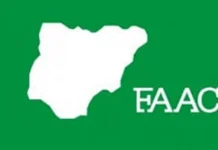A report by PricewaterhouseCoopers, PwC,has indicated that Corruption could cost Nigeria about 37 per cent of its Gross Domestic Product (GDP) if left unchecked. This translates to about N185.37billion of current GDP.
The report, titled: ‘Impact of Corruption on Nigeria’s Economy,’ which was received by Vice President Yemi Osinbajo over the weekend, focused on the ways corruption had impacted the Nigerian economy over time with evidence and impetus for its reduction.
PWC Country and Regional Senior Partner West Market Area, Uyi Akpata, who led the team that presented the report, said: “The results of the study showed that corruption in Nigeria could cost up to 37 per cent of GDP by 2030 if it’s not dealt with immediately. This cost is equated to around $1,000 per person in 2014 and nearly $2,000 per person by 2030.
“The boost in average income that we estimate, given the per capita income, can significantly improve the lives of many in Nigeria.”
Akpata said five steps were used in the report to estimate Nigeria’s cost of corruption, saying the first step was to examine over 30 studies to understand the way corruption affects GDP in the country.
He said the study was obtained from International organisations, including the Organisation for Economic Cooperation and Development (OECD), International Monetary Fund (IMF), Department For International Development (DfID), Transparency International (TI) and in-house studies assessing the health of the economy such as the World in 2050 publication. The IMF study was selected to estimate the impact of corruption on economic growth.
The second step, Akpata stated, was to identify the impact of corruption on economic growth using the IMF study, adding that the study estimated that the impact of one point change in the corruption index results in a 1.2 percentage point change in economic growth per annum.
He said TI’s Corruption Perceptions Index (CPI) was also used as a proxy for corruption. This data set, Akpata said, defines corruption as the ‘abuse of public office for private gain’ and the index was categorised into three parts; Grand corruption, Petty corruption and Political corruption.
The fourth step in the report created three scenarios that show the lower levels of corruption that could have been achieved in the past and can achieve in the future while the fifth step calculated the impact of corruption on economic growth and output for each scenario.












RT @BizWatchNigeria: “Nigeria May Lose 37% of GDP to Corruption” – PWC – https://t.co/JNIpeVWdlV https://t.co/lED6ky1F0e
NEW POST: “Nigeria May Lose 37% of #GDP to Corruption” – #PWC https://t.co/wgWHv4BMqF https://t.co/aR34MrsOjz
RT @BizWatchNigeria: NEW POST: “Nigeria May Lose 37% of #GDP to Corruption” – #PWC https://t.co/wgWHv4BMqF https://t.co/aR34MrsOjz